Erstellt am: 24. 10. 2014 - 20:00 Uhr
Robert Olen Butler and the nature of Yearning
Robert Olen Butler
Listen to a Reality Check Special with Johnny Bliss in an informal chat with the Pulitzer prize-winning author, Robert Olen Butler.
Saturday, October 25th, 12-13, and afterwards seven days on demand.
This year, I attended the 13th International Conference on the Short Story in English, which was co-hosted by the University of Vienna; every two years, it is held in a different city around the world. I'd been turned on to it by a writer friend of mine who lives here. As a result of his suggestion that I come and take part, I had the privilege of making the acquaintance of such esteemed authors as Bharati Mukherjee, Doron Rabinovici, Judith Nika Pfeiffer, and many others*.
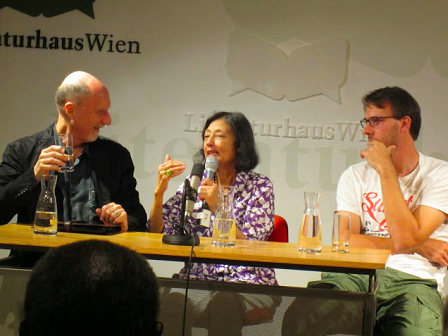
Ron Davis, 2014
* - If you're not massively into literature and short stories, it is entirely possible you don't know many of these names.
God, what are you, some uncultured farmer?! Ha ha!
Kidding.
I also met Robert Olen Butler (see above and below), who gave a public reading of his short story Mother In The Trenches at Vienna's Literaturhaus the night before the beginning of the conference.
His background in theatre was all too clear; his reading was differentiated from the other readings I heard that night by both inflection and body language. It was easy to believe in his characters in a highly physical way.
I also instantly knew that, should I manage to corner Robert for a radio interview, the end product would turn out to be both engaging and informative. On radio, it would "work". And, so it did.
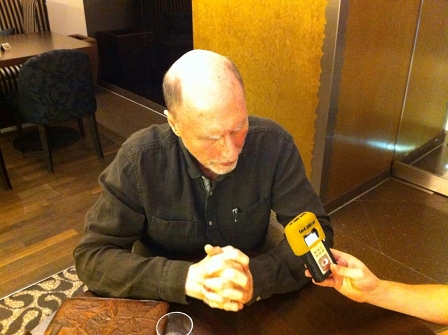
Ryder K. Hawkins, 2014
Robert Olen Butler on Finding your Way
"I thought I wanted to be a playwright. But I was a terrible playwright! My most impassioned writing was going into the stage directions. Now that's a bad sign for a playwright. That suggests a closeted fiction writer.
"So I stopped being a bad playwright, and I started being a bad fiction writer. I wrote a million words of dreck, before I started writing well."
Robert Olen Butler on Language
"[Learning a language] is not a matter of learning the equivalents of words and doing rapid translation. You actually have to, in essence, rename the world, every object.
"You look at a tree in the United States, and it's a cypress. But if you look at that tree in Vietnam, it's bá.
"Everything is changed to that extent, and the very sensual experience of those things is [...] transformed; that moment-to-moment, sensual awareness of things is the key talent of a literary fiction writer."
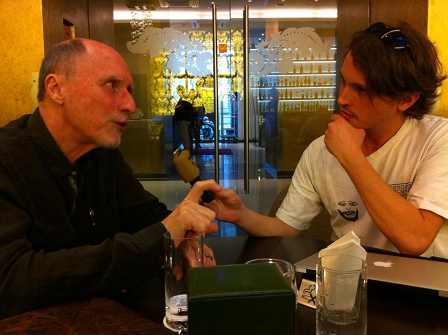
Ryder K. Hawkins, 2014
Robert Olen Butler on Yearning
"Any Buddhist will tell you, you cannot even exist for thirty seconds of time on planet Earth without desiring something. So fiction inescapably is the art form of human yearning, and that's what makes it [...] narrative.
"Plot is simply yearning, challenged and thwarted. Characters deeply want things [...] and their attempts to get those things are challenged, and the way around and through that is what drives narrative forward."
Robert Olen Butler on Mastering your Subconscious
"[To be] entirely able to go without flinching, [or] averting your eyes, into your roiling unconscious, where it's not even literal memory anymore, and things have broken themselves down into sensual parts... that's scary.
"But if you haven't found the courage to do that with yourself, you are so far from being able to authentically enter into [a fictional character]'s unconscious, someone who is quite different from you."
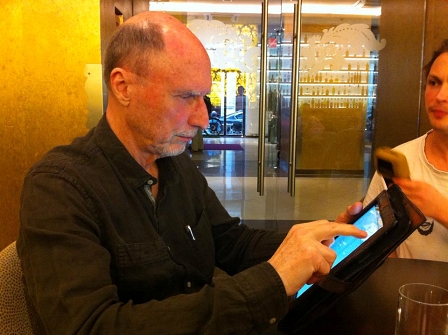
Ryder K. Hawkins, 2014
Robert Olen Butler on Flash Fiction & Beheadings
"I've developed a serious interest in [...] Flash fiction, stories of an extreme short length, usually under five hundred words.
"[For example,] I did a book entitled Severance, based on two epigraphs, one from a French doctor of the 19th century who said that, after due consideration, it's his opinion that's there enough blood left in the brain of a severed head to sustain consciousness for one and a half minutes. The other epigraph is from a handbook of speech which points out that in a heightened state of emotion, we speak at the rate of 160 words per minute.
"So if you do the math, you realize that [the last outburst of internal monologue in a recently severed head] is exactly 240 words long.
"This notion of extended consciousness after the cutting off of a head is very common. Who am I? Or, who was I? And they're not even really fully aware of what's happened to them.
"There have been a lot of beheadings in the world; so I have written these 62 stories, moving from 40,000 BC to very contemporary times, of people who have been beheaded, and what that provoked them to experience."
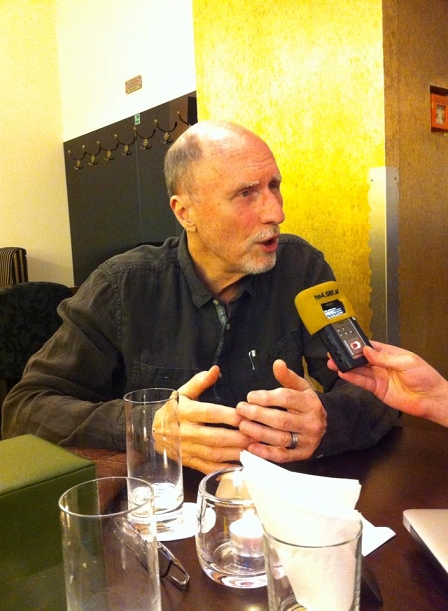
Ryder K. Hawkins, 2014
A FM4 Reality Check Saturday Special on Saturday, October 25
If you miss the program, you can still stream it via the Reality Check podcast or at fm4.ORF.at/7tage.
--
Special thanks are due to Ryder K. Hawkins, without whose "hot tip" I never would have visited the 13th International Conference on the Short Story in English, let alone met Robert Olen Butler, written this article, or made this program. He also, incidentally, did most of the photography.
Special thanks are also due to the author Sylvia Petter, who introduced me to Robert Olen Butler after the conference.


